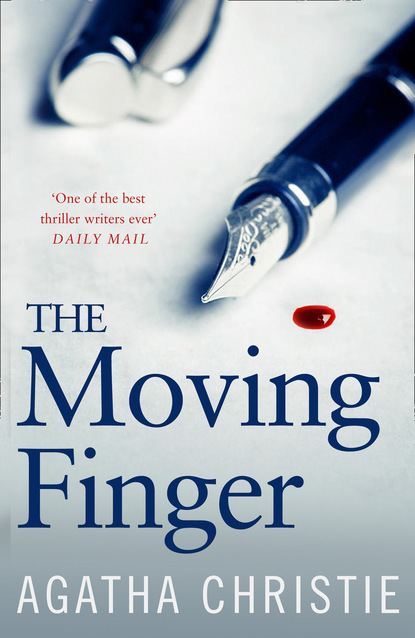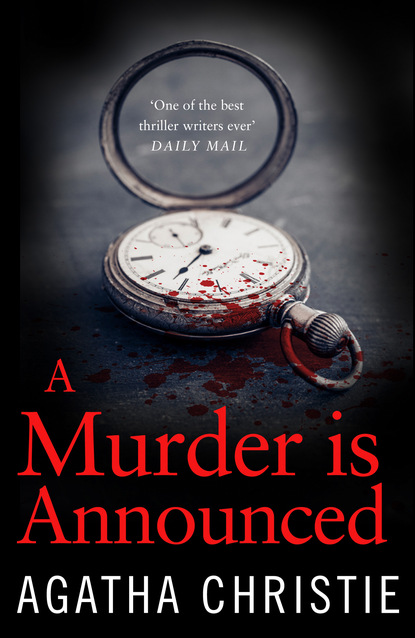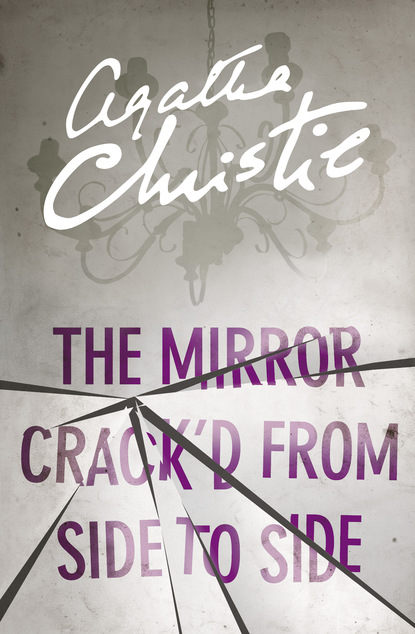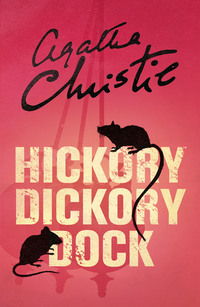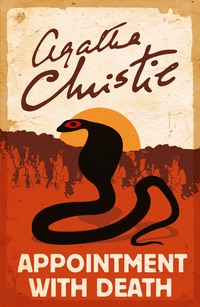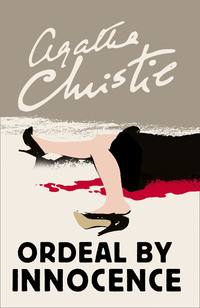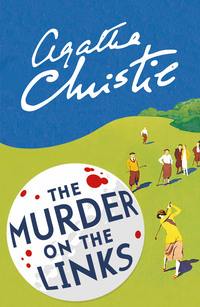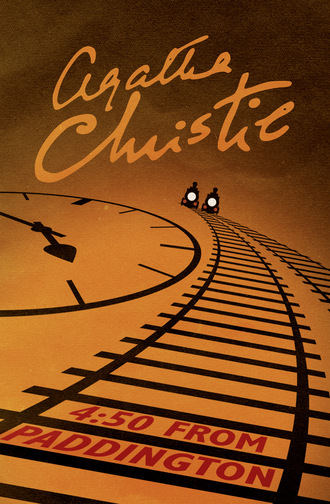
Полная версия
4.50 from Paddington



Copyright
Published by HarperCollinsPublishers Ltd
1 London Bridge Street
London SE1 9GF
www.harpercollins.co.uk
First published in Great Britain by Collins, The Crime Club 1957
4.50 From Paddington™ is a trade mark of Agatha Christie Limited
and Agatha Christie® Marple® and the Agatha Christie Signature are
registered trade marks of Agatha Christie Limited in the UK and elsewhere.
Copyright © 1957 Agatha Christie Limited. All rights reserved.
www.agathachristie.com
Cover by juliejenkinsdesign.com © HarperCollins/Agatha Christie Ltd 2016
Agatha Christie asserts the moral right to be identified as the author of this work.
A catalogue copy of this book is available from the British Library.
This novel is entirely a work of fiction. The names, characters and incidents portrayed in it are the work of the author’s imagination. Any resemblance to actual persons, living or dead, events or localities is entirely coincidental.
All rights reserved under International and Pan-American Copyright Conventions. By payment of the required fees, you have been granted the non-exclusive, non-transferable right to access and read the text of this e-book on screen. No part of this text may be reproduced, transmitted, down-loaded, decompiled, reverse engineered, or stored in or introduced into any information storage and retrieval system, in any form or by any means, whether electronic or mechanical, now known or hereinafter invented, without the express written permission of HarperCollins.
HarperCollinsPublishers has made every reasonable effort to ensure that any picture content and written content in this ebook has been included or removed in accordance with the contractual and technological constraints in operation at the time of publication
Source ISBN: 9780008196585
Ebook Edition © December 2016 ISBN: 9780007422357
Version 2019-01-11
Table of Contents
Cover
Title Page
Copyright
Chapter 1
Chapter 2
Chapter 3
Chapter 4
Chapter 5
Chapter 6
Chapter 7
Chapter 8
Chapter 9
Chapter 10
Chapter 11
Chapter 12
Chapter 13
Chapter 14
Chapter 15
Chapter 16
Chapter 17
Chapter 18
Chapter 19
Chapter 20
Chapter 21
Chapter 22
Chapter 23
Chapter 24
Chapter 25
Chapter 26
Chapter 27
Also by Agatha Christie
About the Publisher
CHAPTER 1
Mrs McGillicuddy panted along the platform in the wake of the porter carrying her suitcase. Mrs McGillicuddy was short and stout, the porter was tall and free-striding. In addition, Mrs McGillicuddy was burdened with a large quantity of parcels; the result of a day’s Christmas shopping. The race was, therefore, an uneven one, and the porter turned the corner at the end of the platform whilst Mrs McGillicuddy was still coming up the straight.
No. 1 Platform was not at the moment unduly crowded, since a train had just gone out, but in the no-man’s-land beyond, a milling crowd was rushing in several directions at once, to and from undergrounds, left-luggage offices, tea-rooms, inquiry offices, indicator boards, and the two outlets, Arrival and Departure, to the outside world.
Mrs McGillicuddy and her parcels were buffeted to and fro, but she arrived eventually at the entrance to No. 3 Platform, and deposited one parcel at her feet whilst she searched her bag for the ticket that would enable her to pass the stern uniformed guardian at the gate.
At that moment, a Voice, raucous yet refined, burst into speech over her head.
‘The train standing at Platform 3,’ the Voice told her, ‘is the 4.50 for Brackhampton, Milchester, Waverton, Carvil Junction, Roxeter and stations to Chadmouth. Passengers for Brackhampton and Milchester travel at the rear of the train. Passengers for Vanequay change at Roxeter.’ The Voice shut itself off with a click, and then reopened conversation by announcing the arrival at Platform 9 of the 4.35 from Birmingham and Wolverhampton.
Mrs McGillicuddy found her ticket and presented it. The man clipped it, murmured: ‘On the right—rear portion.’
Mrs McGillicuddy padded up the platform and found her porter, looking bored and staring into space, outside the door of a third-class carriage.
‘Here you are, lady.’
‘I’m travelling first-class,’ said Mrs McGillicuddy.
‘You didn’t say so,’ grumbled the porter. His eye swept her masculine-looking pepper-and-salt tweed coat disparagingly.
Mrs McGillicuddy, who had said so, did not argue the point. She was sadly out of breath.
The porter retrieved the suitcase and marched with it to the adjoining coach where Mrs McGillicuddy was installed in solitary splendour. The 4.50 was not much patronized, the first-class clientele preferring either the faster morning express, or the 6.40 with dining-car. Mrs McGillicuddy handed the porter his tip which he received with disappointment, clearly considering it more applicable to third-class than to first-class travel. Mrs McGillicuddy, though prepared to spend money on comfortable travel after a night journey from the North and a day’s feverish shopping, was at no time an extravagant tipper.
She settled herself back on the plush cushions with a sigh and opened her magazine. Five minutes later, whistles blew, and the train started. The magazine slipped from Mrs McGillicuddy’s hand, her head dropped sideways, three minutes later she was asleep. She slept for thirty-five minutes and awoke refreshed. Resettling her hat which had slipped askew she sat up and looked out of the window at what she could see of the flying countryside. It was quite dark now, a dreary misty December day—Christmas was only five days ahead. London had been dark and dreary; the country was no less so, though occasionally rendered cheerful with its constant clusters of lights as the train flashed through towns and stations.
‘Serving last tea now,’ said an attendant, whisking open the corridor door like a jinn. Mrs McGillicuddy had already partaken of tea at a large department store. She was for the moment amply nourished. The attendant went on down the corridor uttering his monotonous cry. Mrs McGillicuddy looked up at the rack where her various parcels reposed, with a pleased expression. The face towels had been excellent value and just what Margaret wanted, the space gun for Robby and the rabbit for Jean were highly satisfactory, and that evening coatee was just the thing she herself needed, warm but dressy. The pullover for Hector, too … her mind dwelt with approval on the soundness of her purchases.
Her satisfied gaze returned to the window, a train travelling in the opposite direction rushed by with a screech, making the windows rattle and causing her to start. The train clattered over points and passed through a station.
Then it began suddenly to slow down, presumably in obedience to a signal. For some minutes it crawled along, then stopped, presently it began to move forward again. Another up-train passed them, though with less vehemence than the first one. The train gathered speed again. At that moment another train, also on a down-line, swerved inwards towards them, for a moment with almost alarming effect. For a time the two trains ran parallel, now one gaining a little, now the other. Mrs McGillicuddy looked from her window through the windows of the parallel carriages. Most of the blinds were down, but occasionally the occupants of the carriages were visible. The other train was not very full and there were many empty carriages.
At the moment when the two trains gave the illusion of being stationary, a blind in one of the carriages flew up with a snap. Mrs McGillicuddy looked into the lighted first-class carriage that was only a few feet away.
Then she drew her breath in with a gasp and half-rose to her feet.
Standing with his back to the window and to her was a man. His hands were round the throat of a woman who faced him, and he was slowly, remorselessly, strangling her. Her eyes were starting from their sockets, her face was purple and congested. As Mrs McGillicuddy watched fascinated, the end came; the body went limp and crumpled in the man’s hands.
At the same moment, Mrs McGillicuddy’s train slowed down again and the other began to gain speed. It passed forward and a moment or two later it had vanished from sight.
Almost automatically Mrs McGillicuddy’s hand went up to the communication cord, then paused, irresolute. After all, what use would it be ringing the cord of the train in which she was travelling? The horror of what she had seen at such close quarters, and the unusual circumstances, made her feel paralysed. Some immediate action was necessary—but what?
The door of her compartment was drawn back and a ticket collector said, ‘Ticket, please.’
Mrs McGillicuddy turned to him with vehemence.
‘A woman has been strangled,’ she said. ‘In a train that has just passed. I saw it.’
The ticket collector looked at her doubtfully.
‘I beg your pardon, madam?’
‘A man strangled a woman! In a train. I saw it—through there.’ She pointed to the window.
The ticket collector looked extremely doubtful.
‘Strangled?’ he said disbelievingly.
‘Yes, strangled! I saw it, I tell you. You must do something at once!’
The ticket collector coughed apologetically.
‘You don’t think, madam, that you may have had a little nap and—er—’ he broke off tactfully.
‘I have had a nap, but if you think this was a dream, you’re quite wrong. I saw it, I tell you.’
The ticket collector’s eyes dropped to the open magazine lying on the seat. On the exposed page was a girl being strangled whilst a man with a revolver threatened the pair from an open doorway.
He said persuasively: ‘Now don’t you think, madam, that you’d been reading an exciting story, and that you just dropped off, and awaking a little confused—’
Mrs McGillicuddy interrupted him.
‘I saw it,’ she said. ‘I was as wide awake as you are. And I looked out of the window into the window of the train alongside, and a man was strangling a woman. And what I want to know is, what are you going to do about it?’
‘Well—madam—’
‘You’re going to do something, I suppose?’
The ticket collector sighed reluctantly and glanced at his watch.
‘We shall be in Brackhampton in exactly seven minutes. I’ll report what you’ve told me. In what direction was the train you mention going?’
‘This direction, of course. You don’t suppose I’d have been able to see this if a train had flashed past going in the other direction?’
The ticket collector looked as though he thought Mrs McGillicuddy was quite capable of seeing anything anywhere as the fancy took her. But he remained polite.
‘You can rely on me, madam,’ he said. ‘I will report your statement. Perhaps I might have your name and address—just in case …’
Mrs McGillicuddy gave him the address where she would be staying for the next few days and her permanent address in Scotland, and he wrote them down. Then he withdrew with the air of a man who has done his duty and dealt successfully with a tiresome member of the travelling public.
Mrs McGillicuddy remained frowning and vaguely unsatisfied. Would the ticket collector report her statement? Or had he just been soothing her down? There were, she supposed vaguely, a lot of elderly women travelling around, fully convinced that they had unmasked communist plots, were in danger of being murdered, saw flying saucers and secret space ships, and reported murders that had never taken place. If the man dismissed her as one of those …
The train was slowing down now, passing over points and running through the bright lights of a large town.
Mrs McGillicuddy opened her handbag, pulled out a receipted bill which was all she could find, wrote a rapid note on the back of it with her ball-pen, put it into a spare envelope that she fortunately happened to have, stuck the envelope down and wrote on it.
The train drew slowly into a crowded platform. The usual ubiquitous Voice was intoning:
‘The train now arriving at Platform 1 is the 5.38 for Milchester, Waverton, Roxeter, and stations to Chadmouth. Passengers for Market Basing take the train now waiting at No. 3 platform. No. 1 bay for stopping train to Carbury.’
Mrs McGillicuddy looked anxiously along the platform. So many passengers and so few porters. Ah, there was one! She hailed him authoritatively.
‘Porter! Please take this at once to the Stationmaster’s office.’
She handed him the envelope, and with it a shilling.
Then, with a sigh, she leaned back. Well, she had done what she could. Her mind lingered with an instant’s regret on the shilling … Sixpence would really have been enough …
Her mind went back to the scene she had witnessed. Horrible, quite horrible … She was a strong-nerved woman, but she shivered. What a strange—what a fantastic thing to happen to her, Elspeth McGillicuddy! If the blind of the carriage had not happened to fly up … But that, of course, was Providence.
Providence had willed that she, Elspeth McGillicuddy, should be a witness of the crime. Her lips set grimly.
Voices shouted, whistles blew, doors were banged shut. The 5.38 drew slowly out of Brackhampton station. An hour and five minutes later it stopped at Milchester.
Mrs McGillicuddy collected her parcels and her suitcase and got out. She peered up and down the platform. Her mind reiterated its former judgment: not enough porters. Such porters as there were seemed to be engaged with mail bags and luggage vans. Passengers nowadays seemed always expected to carry their own cases. Well, she couldn’t carry her suitcase and her umbrella and all her parcels. She would have to wait. In due course she secured a porter.
‘Taxi?’
‘There will be something to meet me, I expect.’
Outside Milchester station, a taxi-driver who had been watching the exit came forward. He spoke in a soft local voice.
‘Is it Mrs McGillicuddy? For St Mary Mead?’
Mrs McGillicuddy acknowledged her identity. The porter was recompensed, adequately if not handsomely. The car, with Mrs McGillicuddy, her suitcase, and her parcels drove off into the night. It was a nine-mile drive. Sitting bolt upright in the car, Mrs McGillicuddy was unable to relax. Her feelings yearned for expression. At last the taxi drove along the familiar village street and finally drew up at its destination; Mrs McGillicuddy got out and walked up the brick path to the door. The driver deposited the cases inside as the door was opened by an elderly maid. Mrs McGillicuddy passed straight through the hall to where, at the open sitting-room door, her hostess awaited her; an elderly frail old lady.
‘Elspeth!’
‘Jane!’
They kissed and, without preamble or circumlocution, Mrs McGillicuddy burst into speech.
‘Oh, Jane!’ she wailed. ‘I’ve just seen a murder!’
CHAPTER 2
True to the precepts handed down to her by her mother and grandmother—to wit: that a true lady can neither be shocked nor surprised—Miss Marple merely raised her eyebrows and shook her head, as she said:
‘Most distressing for you, Elspeth, and surely most unusual. I think you had better tell me about it at once.’
That was exactly what Mrs McGillicuddy wanted to do. Allowing her hostess to draw her nearer to the fire, she sat down, pulled off her gloves and plunged into a vivid narrative.
Miss Marple listened with close attention. When Mrs McGillicuddy at last paused for breath, Miss Marple spoke with decision.
‘The best thing, I think, my dear, is for you to go upstairs and take off your hat and have a wash. Then we will have supper—during which we will not discuss this at all. After supper we can go into the matter thoroughly and discuss it from every aspect.’
Mrs McGillicuddy concurred with this suggestion. The two ladies had supper, discussing, as they ate, various aspects of life as lived in the village of St Mary Mead. Miss Marple commented on the general distrust of the new organist, related the recent scandal about the chemist’s wife, and touched on the hostility between the schoolmistress and the village institute. They then discussed Miss Marple’s and Mrs McGillicuddy’s gardens.
‘Paeonies,’ said Miss Marple as she rose from table, ‘are most unaccountable. Either they do—or they don’t do. But if they do establish themselves, they are with you for life, so to speak, and really most beautiful varieties nowadays.’
They settled themselves by the fire again, and Miss Marple brought out two old Waterford glasses from a corner cupboard, and from another cupboard produced a bottle.
‘No coffee to-night for you, Elspeth,’ she said. ‘You are already over-excited (and no wonder!) and probably would not sleep. I prescribe a glass of my cowslip wine, and later, perhaps, a cup of camomile tea.’
Mrs McGillicuddy acquiescing in these arrangements, Miss Marple poured out the wine.
‘Jane,’ said Mrs McGillicuddy, as she took an appreciative sip, ‘you don’t think, do you, that I dreamt it, or imagined it?’
‘Certainly not,’ said Miss Marple with warmth.
Mrs McGillicuddy heaved a sigh of relief.
‘That ticket collector,’ she said, ‘he thought so. Quite polite, but all the same—’
‘I think, Elspeth, that that was quite natural under the circumstances. It sounded—and indeed was—a most unlikely story. And you were a complete stranger to him. No, I have no doubt at all that you saw what you’ve told me you saw. It’s very extraordinary—but not at all impossible. I recollect myself being interested when a train ran parallel to one on which I was travelling, to notice what a vivid and intimate picture one got of what was going on in one or two of the carriages. A little girl, I remember once, playing with a teddy bear, and suddenly she threw it deliberately at a fat man who was asleep in the corner and he bounced up and looked most indignant, and the other passengers looked so amused. I saw them all quite vividly. I could have described afterwards exactly what they looked like and what they had on.’
Mrs McGillicuddy nodded gratefully.
‘That’s just how it was.’
‘The man had his back to you, you say. So you didn’t see his face?’
‘No.’
‘And the woman, you can describe her? Young, old?’
‘Youngish. Between thirty and thirty-five, I should think. I couldn’t say closer than that.’
‘Good-looking?’
‘That again, I couldn’t say. Her face, you see, was all contorted and—’
Miss Marple said quickly:
‘Yes, yes, I quite understand. How was she dressed?’
‘She had on a fur coat of some kind, a palish fur. No hat. Her hair was blonde.’
‘And there was nothing distinctive that you can remember about the man?’
Mrs McGillicuddy took a little time to think carefully before she replied.
‘He was tallish—and dark, I think. He had a heavy coat on so that I couldn’t judge his build very well.’ She added despondently, ‘It’s not really very much to go on.’
‘It’s something,’ said Miss Marple. She paused before saying: ‘You feel quite sure, in your own mind, that the girl was—dead?’
‘She was dead, I’m sure of it. Her tongue came out and—I’d rather not talk about it …’
‘Of course not. Of course not,’ said Miss Marple quickly. ‘We shall know more, I expect, in the morning.’
‘In the morning?’
‘I should imagine it will be in the morning papers. After this man had attacked and killed her, he would have a body on his hands. What would he do? Presumably he would leave the train quickly at the first station—by the way, can you remember if it was a corridor carriage?’
‘No, it was not.’
‘That seems to point to a train that was not going far afield. It would almost certainly stop at Brackhampton. Let us say he leaves the train at Brackhampton, perhaps arranging the body in a corner seat, with her face hidden by the fur collar to delay discovery. Yes—I think that that is what he would do. But of course it will be discovered before very long—and I should imagine that the news of a murdered woman discovered on a train would be almost certain to be in the morning papers—we shall see.’
But it was not in the morning papers.
Miss Marple and Mrs McGillicuddy, after making sure of this, finished their breakfast in silence. Both were reflecting.
After breakfast, they took a turn round the garden. But this, usually an absorbing pastime, was to-day somewhat half-hearted. Miss Marple did indeed call attention to some new and rare species she had acquired for her rock-garden but did so in an almost absent-minded manner. And Mrs McGillicuddy did not, as was customary, counter-attack with a list of her own recent acquisitions.
‘The garden is not looking at all as it should,’ said Miss Marple, but still speaking absent-mindedly. ‘Doctor Haydock has absolutely forbidden me to do any stooping or kneeling—and really, what can you do if you don’t stoop or kneel? There’s old Edwards, of course—but so opinionated. And all this jobbing gets them into bad habits, lots of cups of tea and so much pottering—not any real work.’
‘Oh, I know,’ said Mrs McGillicuddy. ‘Of course, there’s no question of my being forbidden to stoop, but really, especially after meals—and having put on weight’—she looked down at her ample proportions—‘it does bring on heartburn.’
There was a silence and then Mrs McGillicuddy planted her feet sturdily, stood still, and turned on her friend.
‘Well?’ she said.
It was a small insignificant word, but it acquired full significance from Mrs McGillicuddy’s tone, and Miss Marple understood its meaning perfectly.
‘I know,’ she said.
The two ladies looked at each other.
‘I think,’ said Miss Marple, ‘we might walk down to the police station and talk to Sergeant Cornish. He’s intelligent and patient, and I know him very well, and he knows me. I think he’ll listen—and pass the information on to the proper quarter.’
Accordingly, some three-quarters of an hour later, Miss Marple and Mrs McGillicuddy were talking to a fresh-faced grave man between thirty and forty who listened attentively to what they had to say.
Frank Cornish received Miss Marple with cordiality and even deference. He set chairs for the two ladies, and said: ‘Now what can we do for you, Miss Marple?’


